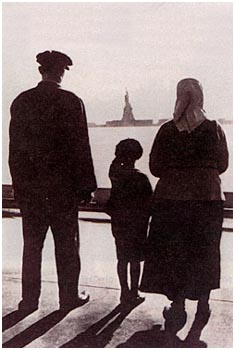History of Ellis
Island
Early History
Ellis Island Timeline
Early Immigration to New York

Image from http://www.ellisisland.com/closing.html
Click Area of Interest:
Ellis Island Introduction
History of Ellis Island
Immigration Experience
Preserving Ellis Island
Ellis Island Museum
Research Family History
Reference Page
To go back
to my 209 Index page click here...
Early History
The island which became the “Golden Door” to the United States had
very humble beginnings: It was originally only 3.3 acres, later expanded
to 27.5 acres by landfill from subway excavations. Earlier in our
history the island had a number of names such as Gull, Oyster, and Gibbets
Island. During the Revolutionary War the island’s ownership fell
into the hands of Samuel Ellis. The island was of little worth until
the government realized its strategic value as a fort to defend against
British invasion. The government obtained the island and hastily
built Fort Gibson; however, the fort was not needed in the War of 1812
and served as an ammunition storehouse. (National Park Service)
Go to top of page
Ellis Island
Timeline:
April 11, 1890 It was designated as an immigration station.
January 1, 1892 It opened as an immigration station.
June 14, 1897 Some buildings were destroyed by fire, but all
persons safely evacuated.
December 17, 1900 It reopened as a larger scale immigration station.
Between 1917-1919 It served as a detention center for enemy
aliens, a way station for navy personnel and as an army hospital.
1919 Served as a deportation center and immigration station
until 1954.
1924 Mass immigration ended. Immigrants were now inspected
in countries of origin.
Between 1939-1946 Part of Ellis was used as a Coast Guard
Station.
Between 1941-1954 Part of Ellis served as a detention center
for enemy aliens.
November 29, 1954 Ellis Island was closed.
May 11, 1965 It was added by Presidential Proclamation to the
Statue of Liberty National Monument.
1976 It was opened to the public for limited seasonal visitation.
1984 It was closed for $160 million restoration, funded
and managed by the Statue of Liberty--Ellis Island Foundation.
September 10, 1990 It reopened with extensive facilities
including a new museum and exhibits.
Go to top of page
Early Immigration to New
York
Prior to 1890, when the federal government took the responsibility,
each state regulated affairs relating to immigration. Immigrants
to New York could disembark from their ships on any pier and they were
free to go without any burdensome inspection until 1855 when an immigration
station was built at Castle Garden, in the Battery. Over time the
public became outraged at the corruption associated with immigration and
at the unfair treatment of immigrants at Castle Garden. The immigration
station was then moved to Ellis Island, the last of three choices.
(History Channel) The $500,000 station opened on
January 1, 1892, and a greatly-reduced number of immigrants entered
due to immigration restrictions. Seven years later the station--along
with important immigration-related papers dating back to 1855--was destroyed
by a fire (causes unknown). A new larger-scale building was constructed,
opening on December 17, 1900. Immigration dropped dramatically during
World War I, and the island was used as a detention center for enemy aliens,
a Navy way station, and an Army hospital. In 1924 most immigrants
were inspected in their home countries and, as a result, massive immigration
ended. Part of Ellis served as a Coast Guard station between 1939-1946,
and once again as a detention center from 1941 until the island was closed
on November 29, 1954, when the immigration station moved to Manhattan.
(U.S. Department of the Interior: National Park Service. Ellis Island:
Gateway to America.)
Go to top of page
